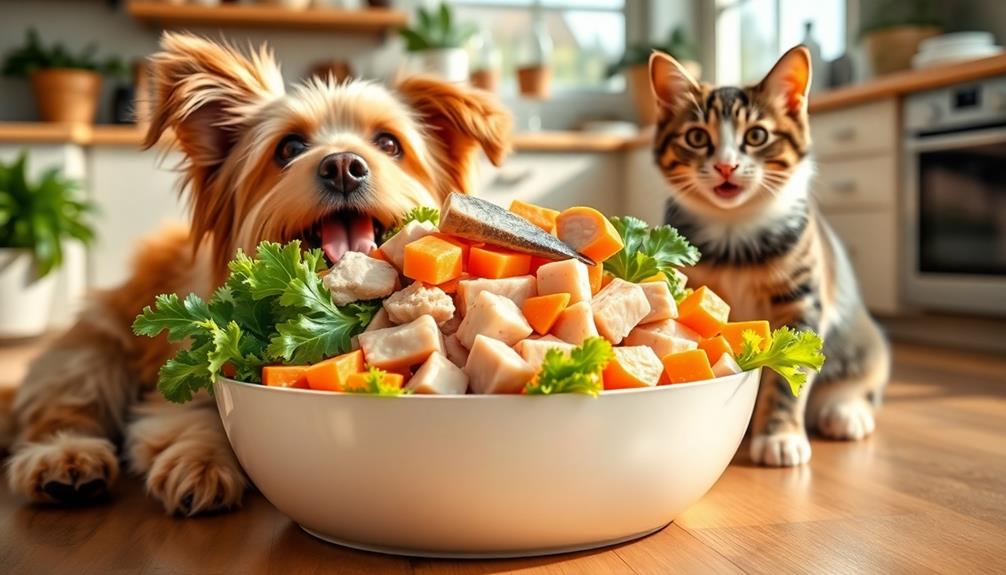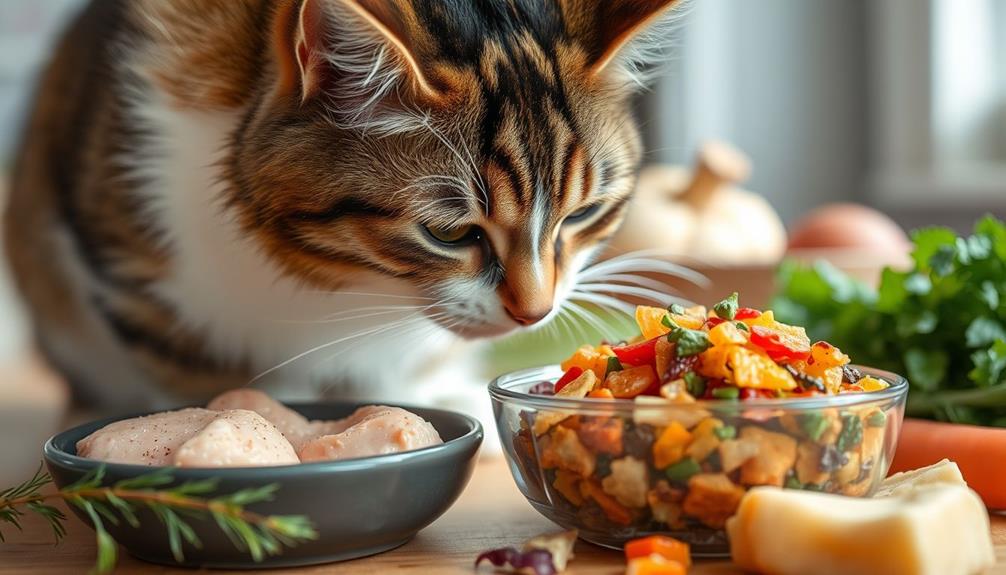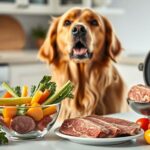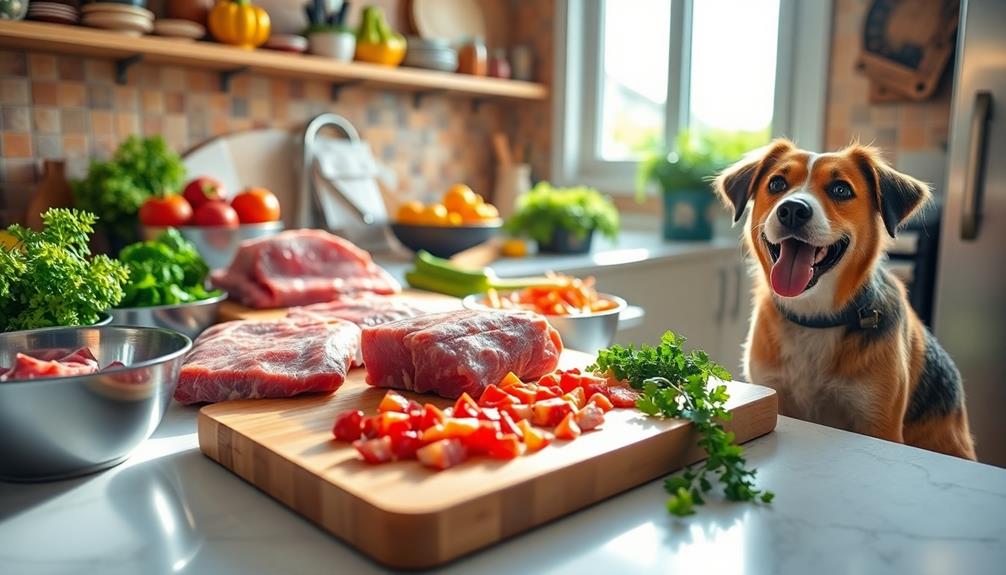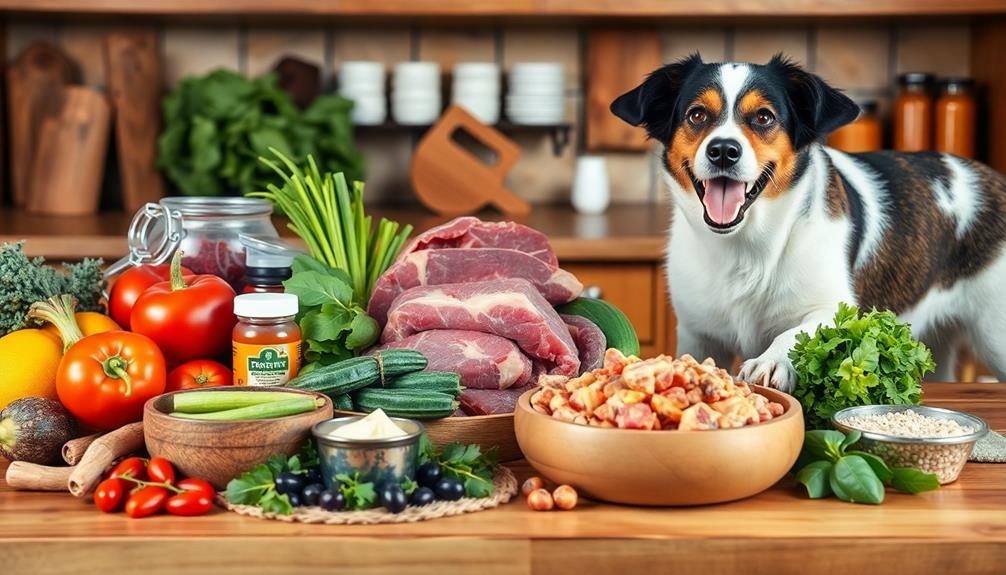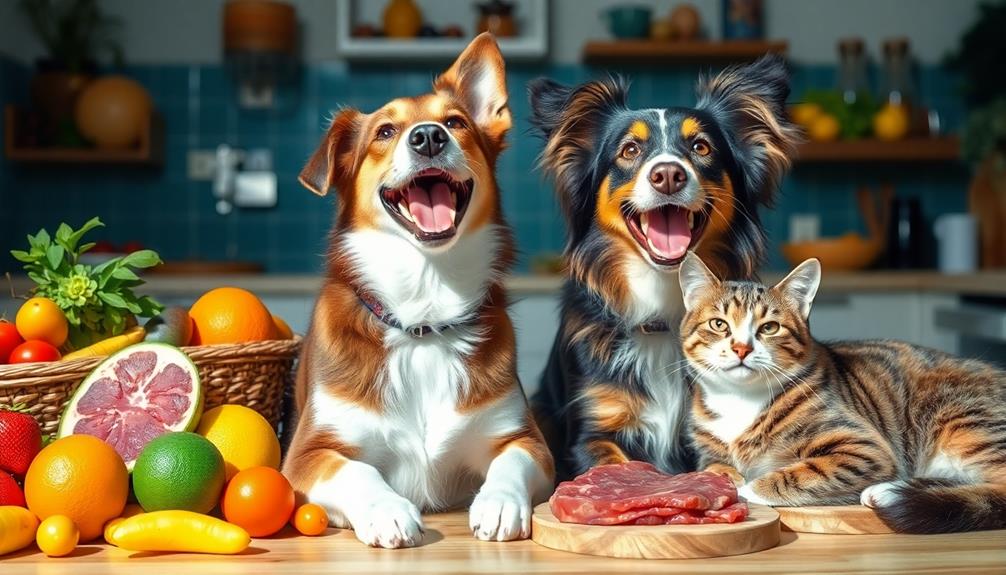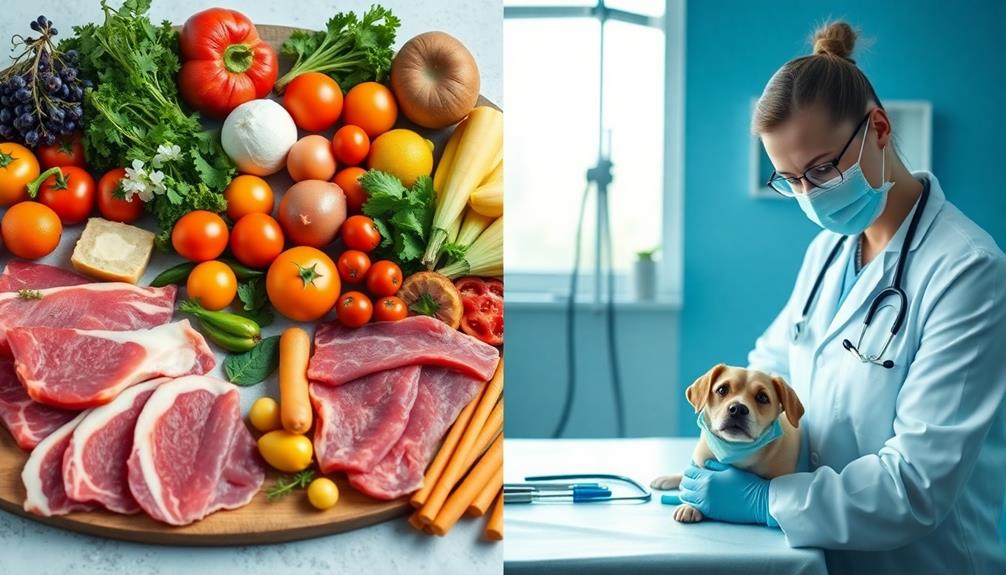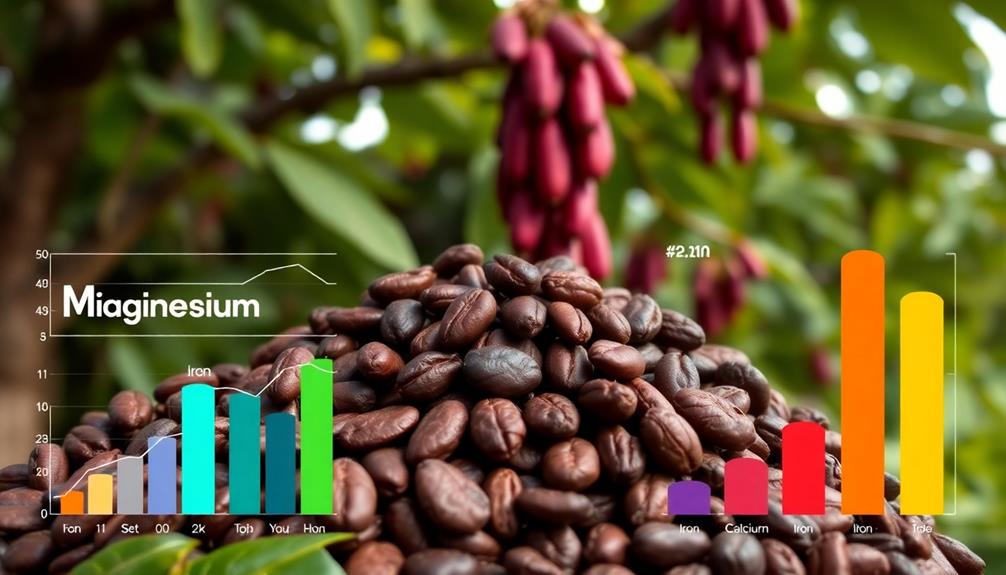Adopting a raw food diet for your pet with health issues can boost their well-being, but it's essential to approach it carefully. Make certain the diet meets their specific nutritional needs to avoid deficiencies that could worsen health problems. For example, pets with kidney issues might need lower protein, while those with allergies benefit from limited ingredients. Always consult a veterinary professional to guarantee a balanced diet and regular monitoring. This expert guidance helps tailor the raw diet effectively to your pet's unique requirements, and there's plenty more to explore about securing their health and safety.
Key Takeaways
- Consult a veterinary nutritionist to ensure a balanced raw food diet that meets specific health needs and avoids nutritional deficiencies.
- Tailor raw diets for pets with health issues, such as low protein for kidney disease or novel proteins for food allergies.
- Monitor your pet's health regularly to identify and address any nutritional gaps or deficiencies in their raw diet.
- Implement safe handling practices to minimize the risk of bacteria exposure when preparing and serving raw food.
- Consider combining raw food with commercial diets to achieve a balanced nutrient profile while accommodating health conditions.
Understanding Raw Food Diets
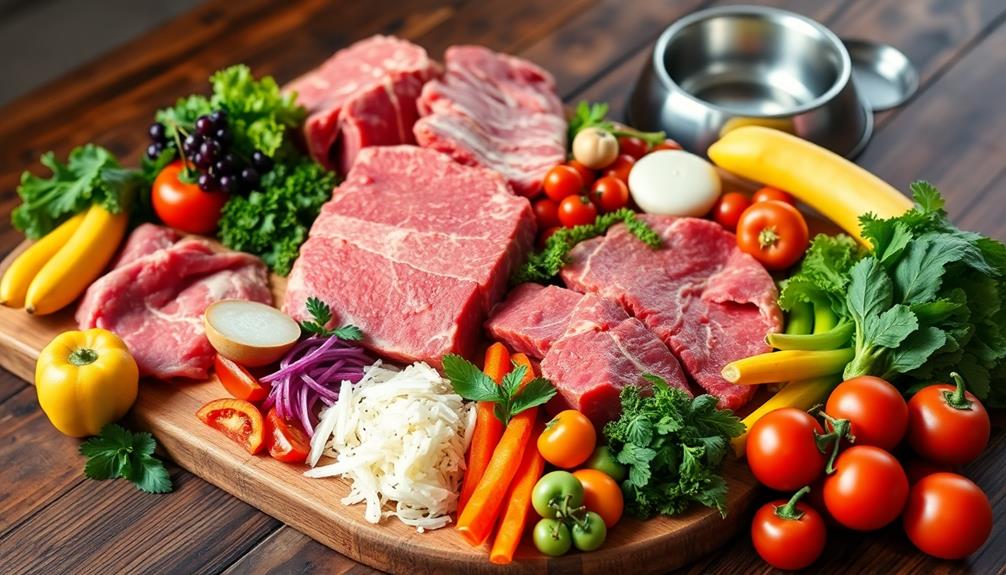
When it comes to your pet's diet, you might've heard about raw food diets, which consist of raw meat, bones, fruits, and vegetables. These diets aim to mimic the natural eating habits of ancestral canines and felines.
While some pet owners advocate for raw food, citing benefits like improved coat condition and higher energy levels, it's vital to understand the potential risks involved.
Research indicates that raw food diets can lead to nutritional deficiencies if not properly balanced. Additionally, there's the risk of exposure to harmful bacteria such as Salmonella and Listeria, which can pose significant health risks not only to your pets but also to you as a pet owner.
The American Veterinary Medical Association (AVMA) advises caution regarding raw diets due to these health dangers.
Before making any changes to your pet's diet, it's important to consult a veterinary nutritionist. They can help guarantee that any raw food meals are balanced and meet your pet's specific health needs.
In many cases, commercially prepared pet foods are recommended as a safer alternative, offering balanced nutrition without the associated risks of raw diets.
Health Benefits for Pets
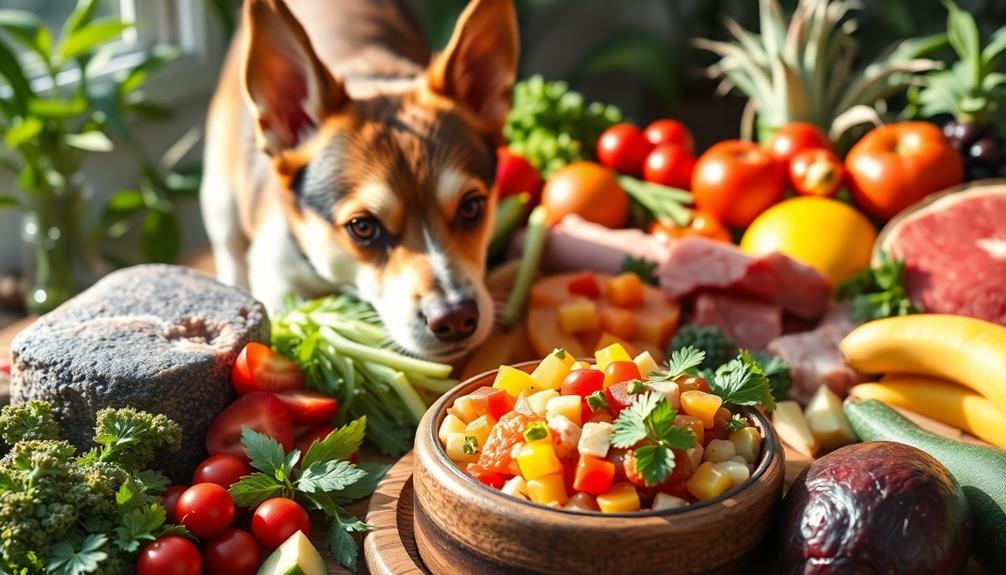
Many pet owners report noticeable health benefits when switching to a raw food diet for their furry companions. One of the most significant advantages is improved digestion and nutrient absorption. The natural enzymes found in raw food diets help break down nutrients more effectively than processed kibble, ensuring your pet gets the most out of every meal.
Additionally, the higher moisture content in raw diets supports hydration and kidney health, which is especially beneficial for pets with urinary tract issues. You'll likely notice an increase in your pet's energy levels as well. Many owners find that their pets exhibit greater liveliness and enthusiasm, particularly those recovering from health issues or surgeries.
Moreover, raw feeding can lead to improved coat condition and skin health, resulting in shinier fur and reduced allergy symptoms. Some anecdotal evidence even suggests that raw diets may alleviate certain gastrointestinal issues, leading to smaller and firmer stools.
Nutritional Deficiencies and Risks
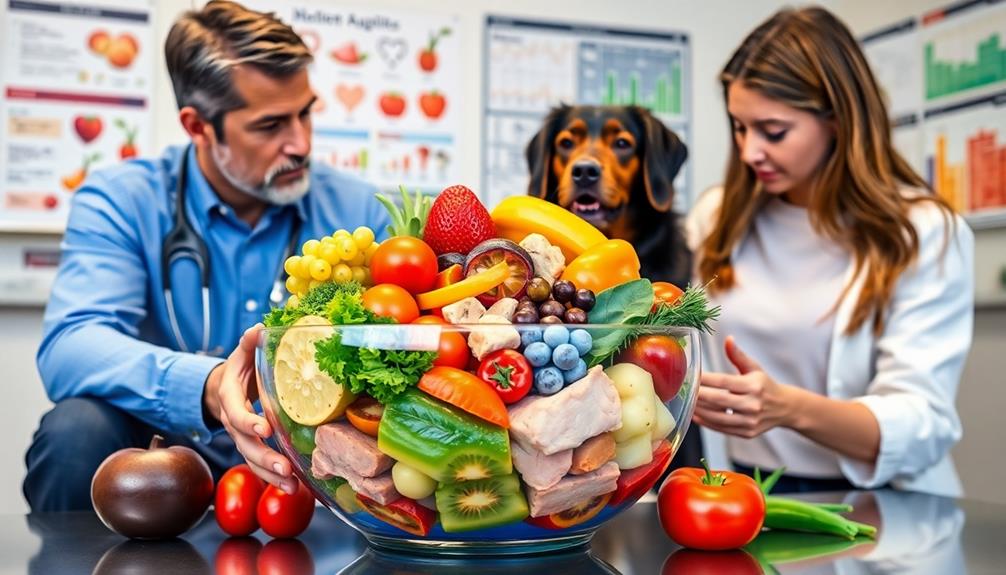
When you consider a raw food diet for your pet, it's vital to be aware of potential nutritional deficiencies.
Many homemade raw diets can lack essential nutrients like calcium, phosphorus, and vitamins, which can lead to serious health risks over time.
Without proper planning and veterinary guidance, your pet could face significant health issues, especially if they've pre-existing conditions.
Essential Nutrient Deficiencies
Raw food diets can pose significant risks, particularly when it comes to essential nutrient deficiencies. Many raw diets lack vital nutrients, which can lead to imbalances in calcium and phosphorus—important for bone health, especially in growing puppies. A study by Lisa M. Freeman, DVM, highlights that homemade raw diets often miss key nutrients, potentially resulting in serious health risks over time.
You might notice symptoms of nutritional deficiencies in your pet, like poor coat condition, a weakened immune response, and increased susceptibility to infections.
The American Veterinary Medical Association (AVMA) stresses that these raw diets frequently fail to meet the balanced nutritional requirements needed for ideal pet health.
That's why regular veterinary consultations are important. By working closely with your vet, you can monitor your pet's nutrient intake and confirm that their raw diet is properly balanced.
This proactive approach will help you avoid deficiencies and the related health issues they can cause. Ultimately, keeping your pet healthy is your priority, and understanding the potential risks of essential nutrient deficiencies is a vital part of that responsibility.
Health Risks Overview
Over time, feeding your pet a raw food diet can lead to serious health risks, especially concerning nutritional deficiencies. Many raw food diets lack important nutrients like calcium and phosphorus, which are critical for your pet's health. According to a study by Lisa M. Freeman, DVM, homemade raw diets often miss necessary vitamins and minerals, increasing the risk of long-term health issues.
Moreover, a raw food diet emphasizes fresh, unprocessed ingredients, which can make it challenging to achieve a balanced nutritional profile without careful planning and preparation properly addressing nutritional needs.
Improperly balanced raw diets can result in excesses or deficiencies of nutrients, potentially worsening existing health conditions in your pets. This is particularly concerning for puppies, as they can face growth issues due to improper calcium and phosphorus ratios, leading to developmental health problems.
In addition, raw pet foods can harbor harmful bacteria such as Salmonella and E. coli, posing significant health risks not only to your pets but also to your household, especially if you have vulnerable individuals.
It's important to weigh these risks carefully when considering a raw food diet for your pet. Properly addressing nutritional needs and ensuring safe food handling can help mitigate some of these dangers, but the risks remain significant and should be taken seriously.
Managing Health Conditions

When managing health conditions in pets, it's crucial to be aware of potential nutritional deficiencies that could arise from a raw food diet.
You'll want to reflect on specialized diet needs based on your pet's specific health issues, ensuring they get the right balance of nutrients.
Always consult veterinary professionals to create a safe and effective dietary plan tailored to your pet's unique situation.
Nutritional Deficiencies Awareness
Steering through the world of raw food diets for pets requires a keen awareness of nutritional deficiencies that can arise from improper meal planning.
If you're considering raw dog food, it's essential to understand that these diets often lack essential nutrients, particularly calcium and phosphorus. These deficiencies can lead to serious health risks, especially in growing puppies who need a proper balance of these minerals for healthy development.
A study by Dr. Lisa M. Freeman emphasizes the potential long-term health issues tied to homemade raw diets, which frequently result in nutritional imbalances.
Pet owners should be particularly cautious with commercial raw diets, as many may not meet the complete nutritional needs of pets with existing health conditions. Regular consultations with a vet nutritionist can help you identify and address potential gaps in your pet's diet.
Specialized Diet Considerations
Managing specialized diet considerations for pets with health conditions can feel overwhelming, but it's essential for their well-being. When dealing with issues like kidney disease, you'll need to focus on raw food diets that are lower in protein and phosphorus. This careful planning helps meet your dog's nutritional needs without causing harm.
If your dog has food allergies or sensitivities, consider a raw diet with novel proteins and limited ingredients for better symptom management.
For diabetic dogs, it's imperative to emphasize low-carbohydrate options, focusing on high-quality protein sources and healthy fats to maintain stable blood sugar levels.
If gastrointestinal issues are a concern, tailor their raw food to include easily digestible proteins and probiotics to support gut health while avoiding irritants.
Regular veterinary consultations are essential for any dog on a specialized raw food diet. These check-ins allow you to monitor your pet's progress and make necessary adjustments to their nutrition, ensuring they receive the right balance of vitamins and minerals.
Consult Veterinary Professionals
Maneuvering a raw food diet for pets with specific health conditions requires expert guidance to confirm your furry friend gets the right nutrients. This is particularly important as certain health issues can complicate dietary needs, similar to how emotional dysregulation can impact relationships in families dealing with divorce and BPD.
Consulting with veterinary professionals is critical for creating a balanced diet that meets your pet's unique health needs. They can help identify any nutritional deficiencies in homemade raw diets, guaranteeing that essential vitamins and minerals are included.
Here are some key reasons to seek veterinary guidance:
- Tailored Diets: Specialized diets may be necessary for conditions like pancreatitis or kidney disease.
- Nutritional Balance: Veterinary nutritionists can confirm your pet's diet contains all essential nutrients.
- Health Monitoring: Regular check-ups help detect potential issues like gastrointestinal upset or nutritional imbalances.
- Safe Changeover: Veterinary professionals provide guidance on smoothly altering your pet to a raw diet, minimizing risks.
Safe Handling Practices
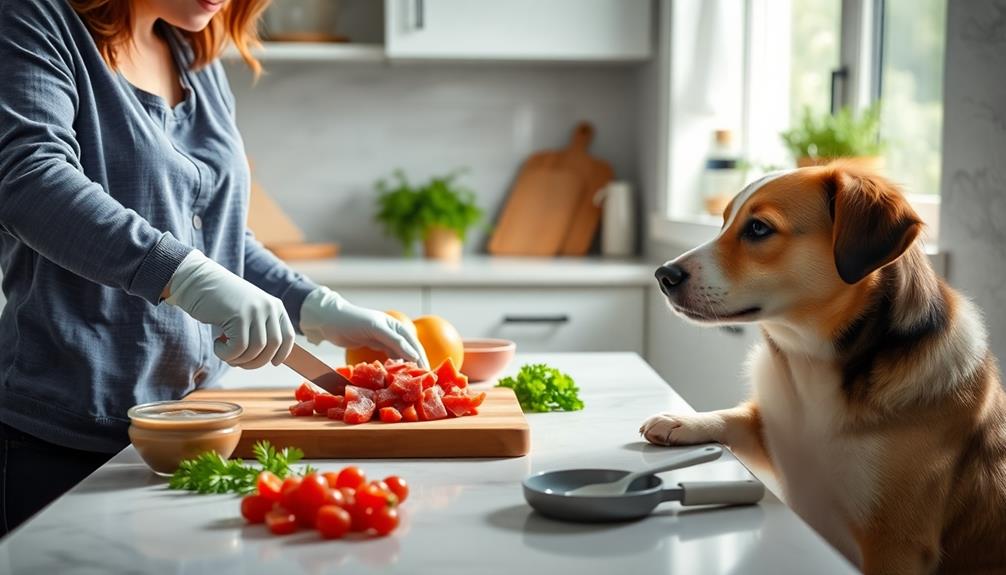
Handling raw pet food requires careful attention to hygiene to keep both you and your pet safe. When you're handling raw food, always wash your hands with soap and water for at least 20 seconds after each interaction. This practice minimizes the risk of food-borne illness.
It's vital to clean and disinfect all surfaces, utensils, and feeding equipment that come into contact with raw pet food. This prevents cross-contamination with human food, which can lead to health issues for you and your pet.
To further enhance safe handling practices, use separate cutting boards and utensils for raw pet food and human food.
When storing raw pet food, keep it in the refrigerator and thaw it safely in the fridge or microwave. Never thaw it at room temperature, as this can promote bacterial growth.
Always supervise your pet while they eat to address any potential choking hazards or digestive issues promptly. By following these guidelines, you can help guarantee a safe and healthy experience for both you and your pet while enjoying the benefits of a raw food diet.
Veterinary Insights and Recommendations

When considering a raw food diet for your pet, it's important to seek guidance from a veterinarian. Veterinary nutritionists stress that pets with health issues may need specific dietary management to prevent nutritional deficiencies often linked to raw food diets.
Additionally, just as some health conditions in humans can reveal underlying issues, pets with certain symptoms may also require a thorough evaluation for potential health risks, such as symptoms of breast cancer. For pets with conditions like kidney disease or pancreatitis, specially formulated commercial diets can be more beneficial compared to high-protein and high-fat raw diets.
Here are some key insights to keep in mind:
- Consult your veterinarian: They can recommend balanced diets tailored to your pet's unique needs.
- Monitor health regularly: Regular check-ups are essential for pets on raw diets to guarantee proper nutrient balance.
- Be cautious with immunocompromised pets: Raw food diets can pose additional health risks for these pets, making veterinary advice critical.
- Avoid DIY diets: Homemade raw diets may lack important nutrients, leading to further health issues.
Following veterinary advice is necessary to guarantee your pet receives the right nutrition, especially when dealing with specific health issues.
Prioritizing their well-being will lead to a healthier, happier life for your furry friend.
Debunking Common Myths
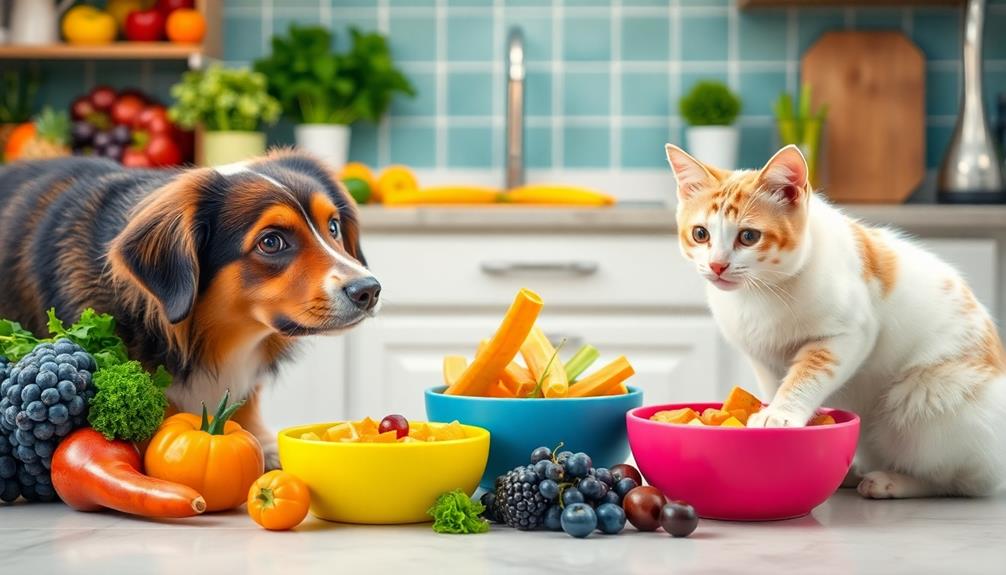
Have you ever wondered what misconceptions surround raw food diets for pets? One common myth is that raw diets are inherently harmful. In reality, high-quality, properly sourced raw food can provide essential nutrients and support overall health when balanced correctly.
Another misconception is that feeding pets raw leads to aggression. However, studies show that behavior is more influenced by training and environment, not diet.
Many believe combining raw and dry food causes gastrointestinal distress, but research indicates that most pets can safely digest both without issues. You might also think raw diets are complicated to implement. Luckily, numerous resources, communities, and commercially prepared options simplify the process for pet owners.
Lastly, some argue that raw diets are always more expensive, but this overlooks the long-term health benefits that can greatly reduce veterinary costs associated with diet-related health issues. A well-planned raw diet can offer balanced nutrition, helping to prevent health issues that could lead to costly treatments.
Frequently Asked Questions
Do Vets Recommend a Raw Diet?
Most vets don't recommend a raw diet due to health risks and nutritional imbalances. They emphasize balanced, commercially prepared food to guarantee your pet gets all necessary nutrients for peak health and safety.
What Is a Healthy Raw Food Diet for Dogs?
A healthy raw food diet for dogs includes a mix of muscle meat, bones, organ meats, fruits, and veggies. Guarantee you maintain proper calcium and phosphorus ratios and use high-quality, human-grade ingredients for best health.
Do Dogs Live Longer on a Raw Food Diet?
Imagine your dog chasing butterflies in a sunlit meadow. While many wonder if raw diets extend lifespan, there's no solid proof; factors like genetics and balanced nutrition play a bigger role in their longevity.
Why Shouldn't You Feed Your Dog Raw Meat?
You shouldn't feed your dog raw meat because it poses health risks like harmful bacteria, potential nutritional deficiencies, and may worsen existing health conditions. Processed diets are safer and provide balanced nutrition for your pet.
Conclusion
Incorporating a raw food diet for your pet can be like revealing a treasure chest of health benefits, especially for those with specific health issues. By understanding the nutritional needs and potential risks, you can pave the way for a happier, healthier life for your furry friend. Always remember to consult your vet and practice safe handling. With the right approach, you're setting the stage for a vibrant, thriving companion who's ready to seize the day!

